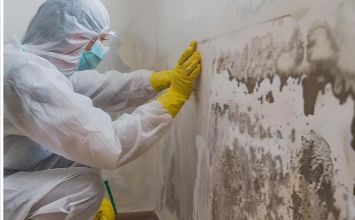Maintaining healthy air inside homes and commercial buildings is essential for well-being and safety. With increasing awareness of environmental health risks, air quality testing in Kitchener has become a necessary service for property owners planning renovations, dealing with mold or asbestos concerns, or experiencing unexplained respiratory issues. Testing the air for harmful particles helps identify potential hazards early and allows for corrective actions to be taken before the situation escalates.
Why Indoor Air Testing Is Crucial
Indoor air can carry invisible threats that impact the health of occupants. Substances like asbestos fibers and mold spores may be present in the air long before any visual signs appear. If inhaled, these particles can cause serious long-term health effects, particularly for children, seniors, and individuals with respiratory conditions.
Air testing becomes especially important:
After renovation or demolition
If there has been water damage or visible mold
During property purchases
When health symptoms like coughing, wheezing, or allergies appear without a clear cause
Testing gives a clear understanding of indoor air safety, helping guide any further action needed.
What Does Air Testing Involve?
Air testing is not a one-size-fits-all process. It uses scientific methods to detect and measure harmful substances in the air. Depending on the issue suspected, the right technique is selected to deliver accurate results.
- Asbestos Fiber Detection
Airborne asbestos fibers cannot be seen with the naked eye. When materials like insulation, tiles, or drywall are disturbed during construction or renovation, they can release these fibers. Specialized testing methods such as:
Phase Contrast Microscopy (PCM)
Transmission Electron Microscopy (TEM)
are used to capture and analyze the air samples for asbestos presence.
- Mold Spore Analysis
Mold spores can lead to allergic reactions, fatigue, and more severe health problems if left unchecked. Even in spaces that appear clean, hidden mold can be active behind walls or under flooring. Spore trap analysis is used to measure mold levels in the air, identifying whether mold problems exist even when they’re not visible.
When Should You Schedule an Air Test?
Air testing should not be treated as a reactive measure only. Proactive testing supports healthier environments and avoids costly mistakes during renovation.
Recommended Scenarios for Testing:
Before demolition or remodeling: identify hazardous substances that could be disturbed.
After abatement procedures: Confirms the environment is safe for re-occupancy.
Property purchase or lease: Ensures the space is free from harmful airborne contaminants.
Health concerns among occupants: Helps link symptoms with air quality issues.
Water damage or damp conditions: Detects mold risk before it spreads.
In any of these cases, scheduling a professional inspection allows informed decisions and safeguards occupants.
Tools and Techniques Used in Air Analysis
Testing is carried out with industry-standard equipment to ensure precision. All samples are analyzed in certified laboratories using approved procedures. This gives confidence in the results and supports any future remediation if required.
Key Methods Include:
Microscopic Analysis (PLM/TEM): Provides clear identification of asbestos fibers in air samples.
Spore Trap Analysis: Helps detect mold spores not visible to the naked eye.
Visual Inspections and Sampling Grids: Aid in accurate and organized data collection across the affected property.
Photo Documentation and Notes: Ensures thorough reporting of sample locations and observed risks.
These tools work together to deliver a reliable report, detailing what substances are present and at what levels.
Benefits of Regular Air Testing
Conducting air quality assessments regularly doesn’t just identify problems—it supports a proactive approach to indoor health and safety. Whether in homes, offices, schools, or rental properties, testing provides several advantages:
- Early Problem Detection
Identifies airborne contaminants before they pose severe health risks or require extensive repairs.
- Compliance with Regulations
Helps property owners meet local health and safety laws, particularly when planning construction or managing multi-tenant buildings.
- Informed Decision-Making
Provides scientific data that guides renovation, cleanup, or remediation efforts effectively.
- Post-Abatement Confirmation
Ensures that asbestos or mold removal was successful and the space is safe for re-use.
- Long-Term Health Protection
Contributes to a safer living and working environment by ensuring breathable air remains clean.
Testing Services You Can Expect
Only services that are scientifically proven and aligned with Ontario safety regulations should be considered when selecting a provider. The following testing and inspection services are typically offered:
Asbestos Air Sampling
Used during or after renovation, especially in older buildings where asbestos may be present in insulation, walls, or ceilings.
Mold Spore Testing
Captures airborne mold particles to evaluate the indoor air quality and identify possible hidden mold sources.
Pre-Renovation and Demolition Surveys
Assess the property for asbestos-containing materials and other substances that could become airborne during construction.
Designated Substances Survey (DSS)
Identifies hazardous materials like asbestos and lead before renovation or demolition as required by Ontario’s O. Reg. 490/09.
What Happens After the Test?
Once the air samples are analyzed, a detailed report is generated. This document includes:
Test methods used
Sample locations
Laboratory results
Interpretation of findings
Recommendations for next steps
This final report allows you to act with clarity, whether it involves abatement, further testing, or no action at all. It becomes a crucial record for compliance, safety planning, and health documentation.
Keeping Indoor Air Safe
Investing in air testing is an investment in health and safety. Whether preparing for renovations or simply ensuring a safe environment, it helps prevent exposure to hazardous particles and provides peace of mind. Testing is not just a safety measure—it’s a responsibility for those managing buildings where others live or work.
If you’re dealing with visible mold, suspect asbestos exposure, or simply want to confirm the air you’re breathing is safe, air quality testing in Kitchener services provide the solution. For professional and certified assistance in identifying airborne risks, you can rely on MSN Environmental to deliver trustworthy, regulation-compliant testing.



